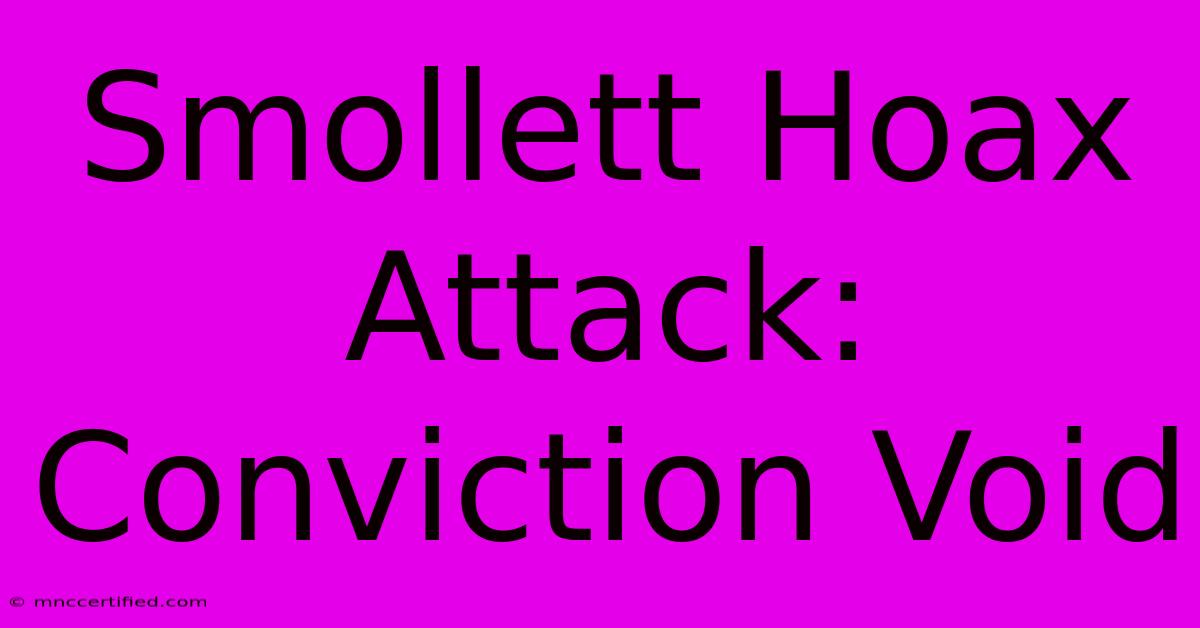Smollett Hoax Attack: Conviction Void

Table of Contents
Smollett Hoax Attack: Conviction Voided – A Deeper Dive into the Case
The Jussie Smollett case, involving allegations of a hate crime hoax, has captivated the nation and sparked intense debate. This article delves into the details of the case, focusing on the controversial voiding of his conviction and the legal ramifications.
Understanding the Initial Charges
In January 2019, actor Jussie Smollett reported a brutal attack, claiming he was assaulted by two masked men who shouted racial and homophobic slurs before placing a noose around his neck. The incident immediately garnered significant media attention, sparking outrage and igniting conversations about hate crimes in America. However, investigations soon revealed inconsistencies in Smollett's account, leading to a dramatic shift in the narrative.
The Investigation and Arrest
Chicago police launched a thorough investigation, scrutinizing Smollett's claims. Evidence emerged suggesting the attack was staged, leading to Smollett's arrest and subsequent charges of disorderly conduct for filing a false police report. This was a significant turning point, transforming a story of alleged victimhood into a case of alleged deception. The charges highlighted the serious consequences of making false statements to law enforcement, especially in sensitive matters involving hate crimes.
The Conviction and its Subsequent Overturning
Smollett was initially convicted on five counts of disorderly conduct. However, this conviction was later overturned by an Illinois appeals court. This decision sparked intense debate, with many questioning the fairness of the legal process and the implications for future cases involving similar allegations. The court's reasoning centered on procedural issues, focusing on the dismissal of some jurors and the number of charges levied against Smollett. This section will delve deeper into the specific legal arguments used to justify the reversal of the conviction.
The Legal Arguments for Voiding the Conviction
The appeal centered on several key arguments. The court focused on the prosecution's decision to dismiss certain jurors, arguing that this process was not handled properly according to established legal protocols. They also scrutinized the number of charges, raising concerns about whether the prosecution had overcharged Smollett, potentially influencing the trial's outcome. These technicalities, while seemingly minor on the surface, were deemed significant enough by the appellate court to warrant the voiding of the conviction.
Implications and Public Reaction
The voiding of Smollett's conviction has had far-reaching implications. It ignited a public debate on the importance of accountability for filing false police reports and raised concerns about the impact of such actions on genuine victims of hate crimes. The decision raised questions about whether the legal system adequately protects those who genuinely experience hate crimes and whether there are sufficient deterrents against individuals who might falsely claim such victimhood for personal gain or publicity. Many feel the ruling undermines the credibility of law enforcement and disrespects true victims of hate crimes.
The Broader Context: False Reporting and Hate Crime Hoaxes
The Smollett case serves as a stark reminder of the potential consequences – both legal and social – of making false accusations, particularly in high-profile cases involving hate crimes. It highlights the importance of thorough investigations and underscores the need for a system that balances the rights of the accused with the need to protect the integrity of the legal process and maintain trust in law enforcement. The case should prompt conversations about how to improve investigations and prosecutions involving accusations of hate crimes, to ensure fair and efficient justice.
Conclusion: An Ongoing Debate
The Smollett case remains a complex and controversial chapter in American jurisprudence. The voiding of his conviction has generated intense discussion about due process, the burden of proof, and the far-reaching impact of false claims, especially in the context of hate crimes. The case serves as a powerful illustration of the complexities within the legal system and the lasting impact of high-profile cases on public perception and discourse. The debate surrounding this case is likely to continue, influencing future legal proceedings and public policy related to hate crimes and false reporting.

Thank you for visiting our website wich cover about Smollett Hoax Attack: Conviction Void. We hope the information provided has been useful to you. Feel free to contact us if you have any questions or need further assistance. See you next time and dont miss to bookmark.
Featured Posts
-
Coral Gables Palace In Uk Documentary
Nov 22, 2024
-
Netanyahu Gallant Icc Arrest Warrants
Nov 22, 2024
-
Pete Wicks Maura Higgins Heartbreak Confirmed
Nov 22, 2024
-
Snowflake Stock Surge Explained
Nov 22, 2024
-
Motorcycle Insurance In Delaware
Nov 22, 2024